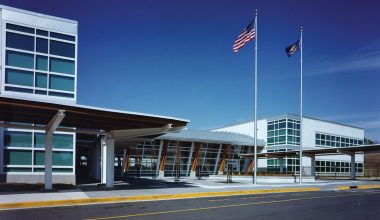Have you ever wondered about the unique benefits that voluntary-aided schools will bring to education in 2024?
The cost of education in the UK can deter anyone who lacks funding from enrolling. VA schools, among other benefits, offer quality education at an affordable rate.
Choosing what school your child should attend in the UK can be overwhelming. If you are considering a voluntary aided school for your ward and wish to learn more about it, this article answers the question “What is a voluntary aided school?” clearly.
You should read to the end to understand the definition of a VA school and how much tuition you have to pay.
Also, it offers a complete guide on the admission process at VA schools in 2024. The table of contents will help you scan through the content.
Table of contents
- What is a voluntary aided school?
- VA Schools’ governing structure
- What is VA Schools curriculum like?
- How much is the voluntary aided school tuition fee?
- Voluntary aided Schools admission process
- Are Voluntary aided schools faith-based schools?
- Top VA schools in the UK
- Frequently Asked Questions
- Conclusion
- References
- Recommendations
What is a voluntary aided school?
A voluntary aided school (VA school) is a state-funded school in England and Wales in which a foundation or trust (usually a religious organization) contributes to building costs and has a substantial influence on the running of the school.
VA school is a type of educational institution in the United Kingdom that maintains its own governing body. They are popular with many parents because they offer a high-quality education in a faith-based environment.
A basic identifying factor of voluntary-aided schools is their affiliation with a religious or faith-based organization. This affiliation plays a significant role in their funding and management. Although they have some similarities with voluntary controlled schools, VA schools are different.
Read Also: When Does High School Start in 2024?
VA Schools’ governing structure
The governing structure of voluntary aided (VA) schools differentiates them from other types of educational institutions.
Unlike community schools, VA schools have their own governing body, often affiliated with a specific religious or faith-based organization.
This governing body is responsible for setting the school’s aims and objectives, appointing the headteacher, and managing the school’s budget.
Also, they ensure the school complies with laws and regulations and oversee the school’s overall performance.
VA schools’ governing structure consists of a board of governors or trustees. Although the number of governors may vary, they typically range from 9 to 15 different types of governors. Most voluntary-aided schools’ governing structures have foundation governors, parent governors, staff governors, etc.
Overall, the governing structure of voluntary-aided schools reflects a unique partnership between the educational institution and its associated religious or faith-based entity.
Read Also: Easy High School To College Transitions: 15 Best On The List
What is VA Schools curriculum like?
The curriculum of voluntary aided (VA) schools reflects the religious or faith-based values associated with the institution. Although similar to state-maintained schools, they have some freedom to teach religious education according to their faith.
The national curriculum sets out the core knowledge and skills that all pupils in England and Wales must learn between the ages of 5 and 16. VA schools may integrate into their curriculum aspects such as religious studies, ethics, and moral education.
These subjects instill a strong sense of values, compassion, and a deep understanding of the beliefs associated with the school’s religious denomination.
In a nutshell, the curriculum of voluntary aided schools offers a unique blend of academic learning and religious or faith-based education
So, besides the national curriculum, VA schools may also offer a range of other subjects and activities, such as:
- Religious education
- Modern foreign languages
- Music
- Art
- Drama
- Sport
- Clubs and societies
Read Also: What Are The High School Stereotypes And Tropes That Are True?
How much is the voluntary aided school tuition fee?
Voluntary aided (VA) schools in England and Wales are state-funded schools, so they do not charge fees to students. However, parents can make a voluntary contribution towards the schools’ maintenance funds.
The school’s governing board sets the amount for the voluntary contribution, and it varies from school to school. Some schools may ask parents to pay a few hundred pounds per year, while others may ask for a few thousand pounds per year.
While parents don’t need to pay the voluntary contribution, there is an expectation that they will do so if they can afford to. The voluntary contributions help schools pay for things like building repairs, new equipment and resources, and extracurricular activities. This contribution ranges from £10 per child to £30 per family each year.
However, some church-voluntary-aided schools may ask for no financial contribution from parents. To get the exact fee you should pay, kindly visit the voluntary aided school’s website for clarity.
Voluntary aided Schools admission process
The admissions process for voluntary aided (VA) schools typically involves several steps designed to ensure a fair and transparent selection of students.
#1. Application Submission
Prospective students or their parents/guardians must first submit an application form directly to the VA school they wish to attend. You can get this form from the school’s website or admissions office.
#2. Supplementary Documentation
Along with the application form, the school may require additional documents. These can include proof of address, birth certificates, reference letters, or any other documents specified by the school.
#3. Application Deadline
It’s important to adhere to the specified deadline for application submissions. Missing the deadline could affect your chances of securing a spot at the school.
#4. Review and Evaluation
The school’s admissions team will review applications once they receive it. They may consider various factors, including proximity to the school, special educational needs, and alignment with the school’s religious beliefs (if applicable).
#5. Admission Criteria
Each VA school may have its own set of admission criteria. These criteria can vary and may include academic achievements, behavior, and other relevant factors.
#6. Notification of Admission
After the review process is complete, the school will notify applicants of the admission decision. This notification will include details on whether the student has been offered a place and any further steps that may be required.
#7. Acceptance and Enrollment
If a student gains admission, the next step is to formally accept the offer and complete the enrollment process. This may involve providing additional documentation, such as medical records or immunization records.
Read Also: Are Grammar Schools Free? How Much Are Grammar School Fees?
Are Voluntary aided schools faith-based schools?
Yes, Voluntary Aided Schools are typically faith-based schools. These schools have a strong affiliation with a specific religious denomination or faith-based organization. This affiliation is a central aspect of their identity and ethos.
Examples of VA schools in England include:
- Catholic schools
- Jewish schools
- Muslim schools
- Hindu schools
- Sikh schools
Top VA schools in the UK
There are some voluntary-aided schools in the UK known for their academic excellence, strong values-based education, and positive contributions to their communities.
Some of them include:
#1. Cardinal Vaughan Memorial School (London):
Located in London, Cardinal Vaughan Memorial School is a Roman Catholic voluntary-aided comprehensive school for boys. It has a strong academic reputation and places a significant emphasis on both academic excellence and spiritual development.
#2. The Blue Coat School (Liverpool):
Liverpool Blue Coat School is one of the oldest Voluntary Aided Schools in the country. It is known for its outstanding academic achievements and its commitment to nurturing well-rounded individuals.
#3. St. Olave’s and St. Saviour’s Grammar School (Orpington):
This voluntary aided grammar school is highly regarded for its exceptional academic standards. It has a strong history of preparing students for top universities.
#4. Cardinal Heenan Catholic High School (Liverpool)
This Catholic Voluntary Aided Secondary School in Liverpool is known for its inclusive and supportive learning environment, as well as its dedication to academic achievement.
#5. St. Mary’s Redcliffe and Temple School (Bristol)
A Church of England Voluntary Aided School, St. Mary Redcliffe and Temple School in Bristol is recognized for its high academic standards and its emphasis on community engagement.
Frequently Asked Questions
While these schools often have a religious affiliation, they are open to students of all faiths and beliefs.
While some may charge fees, many receive funding from their governing bodies, which helps offset costs.
Their unique governing structure and emphasis on faith-based education set them apart.
A VA school is a state-funded school in which a foundation or trust (usually a religious organization) contributes to building costs and has a substantial influence in the running of the school. In most cases, the foundation or trust owns the buildings.
Conclusion
Voluntary-aided schools offer a unique blend of religious or faith-based teachings with a comprehensive academic curriculum.
Understanding the definition, curriculum, fees, and admission process for VA schools in 2024 can help parents and students make informed decisions about their educational journey.
References
- Think Student . Co.UK – What Are Voluntary Aided Schools?
- Leicester.Gov.UK – Understanding the different types of school
- Wikipedia.Org – Voluntary aided school





